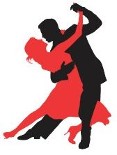Dance Partner WANTED
By Bonnie Burton
Many of you would like to find a dance practice partner. While you may be aware of the benefits, the 'how-to' of finding one may have eluded you. Here are some tips to consider.
Before you begin your search, be the partner you also expect to find.
• Ask yourself: am I an appealing candidate for a dance partnership?
• Like any other relationship, a dance partnership requires care, consideration, time, and effort. Be sure you're willing to make the personal investment necessary to make it a success.
• The advantage of a dance partnership is having someone to take classes and practice with, or to go out dancing with. However, dance partnerships may complicate other parts of your life. The interaction of dance partnerships with your personal and romantic life is something to consider.
• If you continue to improve your dance skills with daily practice and training, you will be in demand. Attend group classes and dances regularly.
Understand your motivation and what you're looking for.
• It's important to decide what you're looking for in a partner before you start the process. Realistic priorities might be a partner of suitable height for you, and that they are healthy and fit. Their schedule, financial situation, and lifestyle should coincide with yours enough to facilitate your dance goals.
• Find a similarly motivated partner. Do you want a dance partner for social dancing and dance demos, or are you interested in finding a partner to compete with? Do you have a specific dance style, such as American smooth, that you want to focus on?
• Communicate and be uplront about what you are seeking in a dance partnership. Be realistic since it will be a challenge, if not downright impossible, to find the perfect dance partner.
• A good dance partner has similar dance skills, goals for improvement, practices often, and has a personality mature enough to communicate diplomatically.
• A good partner should take their dancing seriously, but it should still be obvious that they are enjoying themselves.
Starting the search for a partner.
• Get the word out to dance friends and instructors that you are looking for a partner.
• Check with your instructor to see if they have a recommendation.
• If you want to meet a dance partner, then go to places where the dancers are. Be proactive in asking prospective partners if they are interested in practicing with you.
• A safe initial approach may be to invite them to join you at one of your private lessons or ask them to be your partner for the duration of a particular group class. Once the dance chemistry has been established, schedule some times to practice.
• When you find someone you like as a partner, perhaps suggest you work together for a short-term event such as a showcase at your dance studio, or the next local competition, instead of worrying about a permanent partner right away.
• When you ask to share a specific dance event and nothing beyond that, this removes pressure from the other person about it being a long term arrangement. This also gives you both the freedom to go another direction if it does not work out.
• Initially, a regular practice partner may be helpful for your dancing and prepare you for a competition partner when one comes along.
• You may not find an all-in-one dance partner. Instead, you may find one for practicing, one for lessons, and another for social dance occasions.
Working with a partner when you find them.
• Set dance goals. Once you find a partner, discuss goals and expectations and agree how to share the cost of private lessons if you choose to do that.
• It's important to decide how frequently to get together to practice or take lessons, and the
duration of the practice sessions.
• Attitude matters - the way to attain the most joy and success is to always work with the idea of helping each other.
• Always treat each other with respect and have patience for errors. Try not to let frustration
interfere with the quality of the partnership. Let your coach or dance instructor resolve any
differences about how a move should be performed.
• Be the partner you expect your partner to be.











